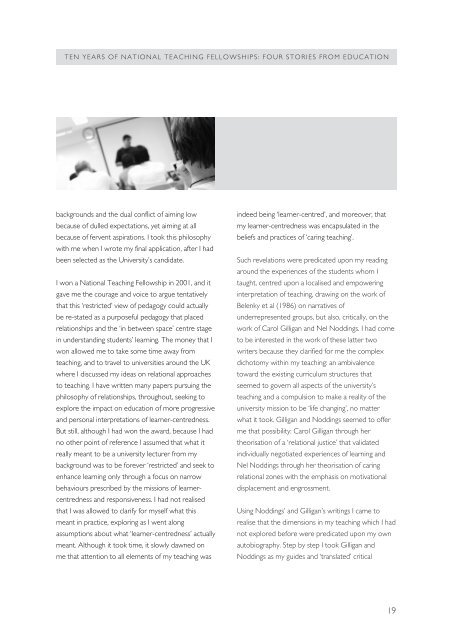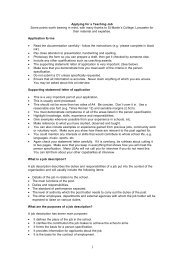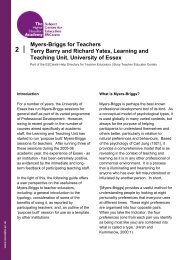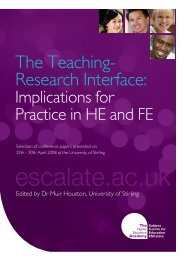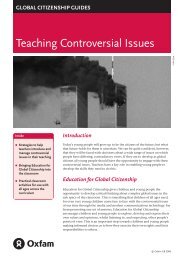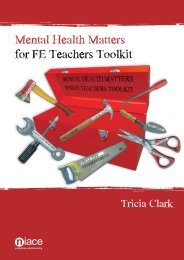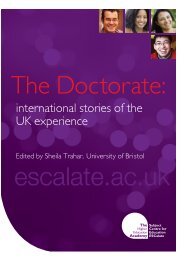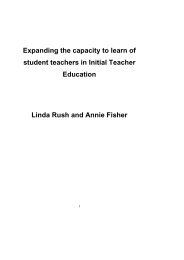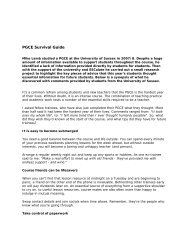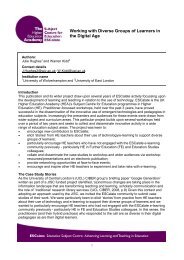pdf 4.2MB - ESCalate
pdf 4.2MB - ESCalate
pdf 4.2MB - ESCalate
You also want an ePaper? Increase the reach of your titles
YUMPU automatically turns print PDFs into web optimized ePapers that Google loves.
TEN YEARS OF NATIONAL TEACHING FELLOWSHIPS: FOUR STORIES FROM EDUCATIONbackgrounds and the dual conflict of aiming lowbecause of dulled expectations, yet aiming at allbecause of fervent aspirations. I took this philosophywith me when I wrote my final application, after I hadbeen selected as the University’s candidate.I won a National Teaching Fellowship in 2001, and itgave me the courage and voice to argue tentativelythat this ‘restricted’ view of pedagogy could actuallybe re-stated as a purposeful pedagogy that placedrelationships and the ‘in between space’ centre stagein understanding students’ learning. The money that Iwon allowed me to take some time away fromteaching, and to travel to universities around the UKwhere I discussed my ideas on relational approachesto teaching. I have written many papers pursuing thephilosophy of relationships, throughout, seeking toexplore the impact on education of more progressiveand personal interpretations of learner-centredness.But still, although I had won the award, because I hadno other point of reference I assumed that what itreally meant to be a university lecturer from mybackground was to be forever ‘restricted’ and seek toenhance learning only through a focus on narrowbehaviours prescribed by the missions of learnercentrednessand responsiveness. I had not realisedthat I was allowed to clarify for myself what thismeant in practice, exploring as I went alongassumptions about what ‘learner-centredness’ actuallymeant. Although it took time, it slowly dawned onme that attention to all elements of my teaching wasindeed being ‘learner-centred’, and moreover, thatmy learner-centredness was encapsulated in thebeliefs and practices of ‘caring teaching’.Such revelations were predicated upon my readingaround the experiences of the students whom Itaught, centred upon a localised and empoweringinterpretation of teaching, drawing on the work ofBelenky et al (1986) on narratives ofunderrepresented groups, but also, critically, on thework of Carol Gilligan and Nel Noddings. I had cometo be interested in the work of these latter twowriters because they clarified for me the complexdichotomy within my teaching: an ambivalencetoward the existing curriculum structures thatseemed to govern all aspects of the university’steaching and a compulsion to make a reality of theuniversity mission to be ‘life changing’, no matterwhat it took. Gilligan and Noddings seemed to offerme that possibility: Carol Gilligan through hertheorisation of a ‘relational justice’ that validatedindividually negotiated experiences of learning andNel Noddings through her theorisation of caringrelational zones with the emphasis on motivationaldisplacement and engrossment.Using Noddings’ and Gilligan’s writings I came torealise that the dimensions in my teaching which I hadnot explored before were predicated upon my ownautobiography. Step by step I took Gilligan andNoddings as my guides and ‘translated’ critical19


